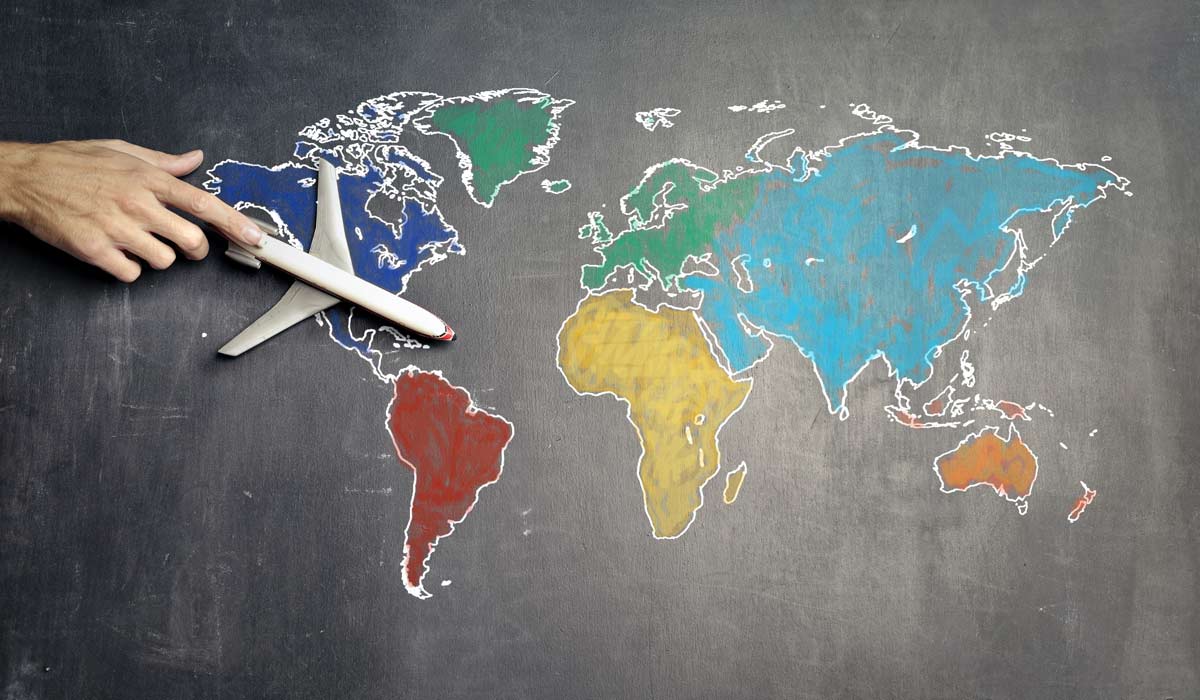This post is also available in:
 Español
Español
Have you ever traveled abroad and felt relieved when you found someone who speaks your native language?
This happens to us Spanish speakers fairly often because, well… there are many of us. However, sometimes we even have trouble understanding each other. There are so many Spanish-speaking countries and so many variations of the language that misunderstandings are bound to happen, and sometimes they can get you into trouble…
My (embarrassing) experience
Who doesn’t like a little bit of gossip, right?
To put things in context: a Colombian woman arrives in Spain with many concerns but with the peace of mind of at least knowing the local language. I was being naive, of course.
I was on a crowded bus and the driver kept asking us to move back a little further so that more people could get on. Trying to help out, I decided to shout: “¡Que se corran un poquito!” If you are Spanish you already know what it means and you can imagine how mortified I was when the younger passengers on the bus started spreading their giggles to others. As we say in Spanish, my face turned tomato colour.
Thankfully, a girl saw my red face and confused look saying “I don’t understand anything”, and came up to me to explain that in Spain “correrse” (which, to me, simply means to “move along”) also had another meaning – but please don’t make me tell you here, I was already embarrassed at the time. If you are not Spanish and you don’t know what I am talking about, Google it. You will understand me.
As you can see, whether Spanish is your mother tongue or you have studied it extensively and therefore you think you can speak it anywhere, I’m sorry to tell you that you are wrong. So in this post I am going to give you some words that you will appreciate knowing if you decide to travel around Latin America, either so that you don’t have to go through the same embarrassment that I did or so that you can understand “la jerga urbana” (slang) of the place you are in. You are welcome.
Same word, different meaning
You may use a word in your everyday life that, unknowingly to you, is not very appropriate in the neighbouring country. Spanish is not an easy language, so keep this list handy on your trip to Latin America or Spain, learn where to say what and you will save yourself more than one problem. Here we go:
- Chapa/s
- Culo
- Taco
- Coger
- Concha
- Cacho
- Paja
- Palo
- Machete
- Porro
🇺🇸Literal translation ≫ Chapa = Metal Sheet, Plate, Veneer, Badge
This word is funny.
In Argentina if you are a “chapa” (you are a veneer), you are crazy, although they also use it to refer to a passionate kiss (Esa pareja estaba chapando en el cine ≫ That couple was plating in the cinema ≫ That couple was kissing in the cinema).
In Colombia, Peru or Bolivia, if you get a “chapa”, you have a nickname and if you go to countries like Ecuador, a “chapa” is a way to call a police officer.
In Spain, if you are a “chapa”, you don’t stop talking, but also if you “chapas” a place, it means that you close it (Chapa la tienda ≫ Plate the shop ≫ Close the shop / La tienda estaba chapada ≫ The shop was plated ≫ The shop was closed). The Spanish always making everything easy for us, of course.
🇺🇸Literal translation ≫ Culo = Ass
In most Spanish-speaking countries, “culo” refers to the behind, but it is good to know other meanings of this word, so you will not be surprised or offended if in Argentina they tell you that you have a good “culo”, because they’re actually telling you that you have good luck.
In Colombia, it is used as an expression to say that something is nice, so take it as a compliment if someone tells you: “Vaya culo de camisa” (Your shirt is an ass ≫ Your shirt is nice). Although it is also used to express that something was easy (El examen estuvo muy culo ≫ The test was very ass ≫ The test was very easy) or to mean nothing (Me preguntaron pero no sabía un culo ≫ They asked me but I didn’t know an ass ≫ They asked me but I knew nothing).
If in Mexico you are a “culo” (you are an ass), it means that you are a fearful person, and in Peru if they love you one “culo” (love you an ass), it means that they love you very much.
However, it can also mean something bad, because “ir como el culo” (to go as the ass), “estar de culo” (to be of the ass) or “pasarlo como el culo” (spend it as the ass) in Spain, means having a very bad time.
🇺🇸Literal translation ≫ Taco = block, cue, stud, cleat, wad, heel
If you travel to Mexico, don’t leave without having a taco, a delicious meal we’re sure you’ve heard of. But if you are in a “taco” in Chile or Colombia, you will probably be late because it means you are in a traffic jam (in Spain this would be called being in a “caravana” ≫ a van).
In Venezuela, to be a taco is to be very smart but in Spain, to say a taco is to say a rude word, a rudeness (Ese niño dice muchos tacos ≫ That child says many tacos ≫ That child says many rudeness).
However, taco in Spain is also used to refer to a large amount (He escrito un taco de papeles ≫ I’ve written a paper taco ≫ I’ve written a lot of papers). If we put it all together, a child could say un taco de tacos ≫ cue of cues ≫ a lot of rude words.
Mexican taco
🇺🇸Literal translation ≫ Coger = take, hold, pick up
Be careful with this verb! If you have learned Spanish in Spain or you are from there, for you “coger” is a common verb and you will say it 24/7, because it has several meanings and all of them are very useful.
“Coger algo” (to take something) in Spain means to grab it with your hands. Of course, it has a few other uses: it can also mean buying something (¿Te has cogido al final el coche que querías? ≫ Did you finally take the car you wanted? ≫ Did you finally buy the car you wanted?). But also, “coger el teléfono” (taking the phone) is answering a call (Te he llamado pero no me has cogido el teléfono ≫ I’ve called you but you have not taken the phone ≫ I called you but you didn’t answer your phone).
However, if you travel to Latin America, do not tell anyone that you want to “coger” (take) something, unless you have sexual intentions. (Escuché coger a mis vecinos ≫ I listened to my neighbors taking ≫ Do you really need me to translate it?)
🇺🇸Literal translation ≫ Concha = shell
Another word that can get you in trouble if you’re not careful. In most parts of Latin America the word “concha” means vulva. However, in Argentina and Bolivia concha can also mean luck (Qué concha tienes, pensaba que no ibas a aprobar ≫ What a concha you’ve got, I didn’t think you’d pass ≫ You’re so lucky, I didn’t think you’d pass) and in Colombia and Mexico it can refer to someone who’s lazy (Qué concha tiene, no trabaja ni hace nada ≫ What a concha he has, he doesn’t work or do anything at all ≫ He’s so lazy, he doesn’t work or do anything at all).
In Spain, however, Concha is a common female name, short for Concepción. Therefore, “la concha de tu madre” (your mother’s shell) might have slightly different meanings in Spain and Argentine – although I’d suggest avoiding that phrase everywhere, just in case.
🇺🇸Literal translation ≫ Cacho = Piece
Unlike every word we’ve talked about in this post so far, “cacho” doesn’t have a literal translation to English. It does have lots of different meanings depending on the country and context, so let’s get into it. In Latin America, it usually refers to a moment or bit of time (¡Espérame un cacho! ≫ Wait for a little bit!) although in Spain it means a portion of something (Me he comido un cacho de pastel ≫ I ate a piece of cake) or something that’s very big (¡Cacho coche! ≫ That’s a big car! / ¡Qué cacho casa te has comprado! ≫ That’s a big house you bought! ). “Cacho”, like every other word in Spanish, can also have a sexual connotation (Anoche pillé cacho ≫ Last night I hooked up with someone).
However, in Chile “cacho” can be used to describe objects that aren’t useful anymore (Estos juguetes ya son un cacho ≫ These toys aren’t useful anymore) or to refer to the horns of an animal (Qué cachos tiene ese ciervo ≫ That deer has some horns ).
In Ecuador if someone tells you a “cacho”, they’re telling you a joke, although they might be lying to you instead. For example, “Jajaja, qué cacho más bueno” could either translate to “Hahaha, that was a great joke” and “eso es una gran mentira” means “that was a big lie“, it depends on the context. Yes, I know, very confusing.
Meanwhile, in Venezuela if someone is putting “cachos” on you… I’m sorry, they’re cheating on you.
🇺🇸Literal translation ≫ Paja = hay
In many Spanish-speaking countries like Argentina, Spain, Chile, Colombia or Guatemala, “paja” refers to male masturbation, but it also has a few different meanings.
In Argentina when something gives you “paja” it means you can’t be bothered to do it (Me da paja ir hasta allí ≫ Going there gives me hay ≫ I can’t be bothered to go there) and, in Chile, being made “paja” means you’re tired or in a bad mood (Estoy hecha paja ≫ I’m made hay ≫ I’m really tired), although if something gives you “paja”, it makes you feel shy or embarrassed (Me da paja hablar en público ≫ Public speaking gives me hay ≫ I’m embarrassed to speak in public).
In Guatemala or Colombia, a “paja” is also a lie (Solo hablas pajas ≫ You only talk hay ≫ You only tell lies) but in Spain “paja” refers to unnecessary, boring or unimportant information (La clase fue interesante al principio, luego fue todo paja ≫ The class was interesting at the beginning, but then it was all hay ≫ The class was interesting at the beginning, but the rest was useless).
🇺🇸Literal translation ≫ Palo = stick, post, pole, handle
In Argentina, a “palo” is a strong blow (Menudo palo se dio ese auto ≫ That car received a big stick ≫ That car was hit very hard) but it can also be used there and in Colombia to refer to any amount of money over a million (Ganó un palo en la lotería ≫ They won a pole in the lottery ≫ They won over a million in the lottery).
In Puerto Rico or Venezuela if someone gives you a “palo” they’re offering a drink and, believe me, it’s not a soft drink.
The winner of the “Countries with most meanings for the word palo” award is definitely Spain. If something gives “palo” to a Spaniard, it means it makes them embarrassed. (Me da palo hablar con ella ≫ Speaking with her gives me stick ≫ I’m embarrassed to talk to her), although “palo” can also mean very bad news (Se murió su abuelo, vaya palo ≫ Their grandfather passed away, what a stick ≫ Their grandfather passed away, that’s terrible).
They also use this word to refer to something with an unreasonably high price, usually for services (Fuimos a cenar y menudo palo nos dieron ≫ We went for dinner and what a stick they gave us ≫ We went for dinner and it was very expensive). And a tip if you’re traveling to Spain: if someone wants to give you the “palo”, run, because they want to steal from you. Don’t worry, it’s not very likely to happen.
🇺🇸Literal translation ≫ Machete = machete
Even though this word can be seem very straightforward for English speakers, in Spanish it also has very different meanings depending on the country. In Argentina or Colombia, a “machete” is a piece of paper a student might use during an exam to cheat (in Spain, this is called a chuleta, also meaning lamb chop), but in Bolivia or Peru, “machete” refers to someone’s (male) partner (Ella se fue con su machete al cine ≫ She went to the cinema with her machete ≫ She went to the cinema with her boyfriend).
In Chile, like in most other countries, a “machete” is a broad, heavy knife, but it can also be used as a verb to refer to someone who takes advantage of others (Deja de pedir dinero que no te hace falta, deja de machetear ≫ Stop asking for money you don’t need, stop machetting ≫ Stop asking for money you don’t need and trying to take advantage of other people ). In Uruguay, someone who’s “machete” is someone who doesn’t like spending money (Con el dinero que tiene y lo machete que es ≫ He’s so machete for someone with that much money ≫ He’s so stingy for someone with that much money).
In Venezuela, “machete” can refer both to the penis, or something that’s in good or perfect condition (-¿Cómo está el agua? -¡Machete! ≫ -How’s the water? -Machete! ≫How’s the water? -Just right!).
🇺🇸Literal translation ≫ Porro = Joint
Like “cacho”, “porro” doesn’t have a direct translation to English. In most Spanish-speaking countries like Argentina, España, Bolivia, Colombia, México o Venezuela, a “porro” is a joint.
In Argentina or Chile, apart from that, “porro” can also be used to describe someone who doesn’t study much or is generally lazy (No pasó de curso por porro ≫ He didn’t pass the year because he was a porro ≫ He didn’t pass the year because he was lazy). In Colombia, “porro” is also a dance move (Está bailando un porro ≫ They’re dancing a porro), so if someone offers you a “porro”, make sure you know exactly what they’re talking about before accepting it.
Is Spanish a hard language to learn?
As you might have realized throughout this post, Spanish isn’t that easy even to native speakers. It’s a rather complex language, but even though it can be confusing at times, some misunderstandings can also make for great anecdotes in the right context.
Before ending this post I want to include this video with two fellow countrymen who explain everything I’ve talked about perfectly and, hopefully, will help you understand how hard it is to speak Spanish… ¡Qué razón tenéis!
I hope I helped you discover some fun facts about Spanish you didn’t know about. Remember to save this post for you travels to Latin America or Spain, it might come in handy if suddenly you have no idea what someone is talking about.
If you know any other words with multiple meanings, or different meanings for any of the words we talked about, please let us know in the comments! Knowledge is power…✌️






